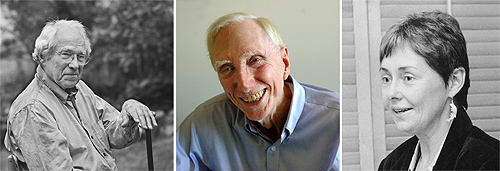Berkeleyan
 The life and influence of the Rev. William Sloane Coffin (above left), who died last year, inform the selection process for the prize that bears his name. The initial recipients of the Berkeley award (the Yale Divinity School has been presenting one for several years) are sociologist Robert Bellah (center) and medical anthropologist Nancy Scheper-Hughes. (Coffin photo courtesy Yale Divinity School; Bellah photo by Peg Skorpinski; Scheper-Hughes photo by David Maung) |
Bellah, Scheper-Hughes to receive initial Sloane Coffin award
Named for longtime activist chaplain, award recognizes those who exercise moral leadership tied to the campus community
![]()
Editor's note: The original version of this story contained several errors; the corrected version, published April 9, is below.
| 04 April 2007
The first Berkeley William Sloane Coffin Jr. Awards, recognizing moral leadership tied to the UC Berkeley community, will be bestowed on campus scholars Robert Bellah and Nancy Scheper-Hughes in ceremonies on Thursday, April 12. The committee that made the selections includes faculty from many faiths, campus staff and students, and First Congregational Church of Berkeley leaders.
Coffin (1924-2006), longtime chaplain at Yale University, was an activist in the civil-rights and peace movements and a vocal critic of the Vietnam war and the nuclear-arms race. He died a year ago at the age of 81.
Bellah is UC Berkeley's Elliott Professor Emeritus of Sociology and an authority on religion. In a letter to the New York Review of Books in 1977, replying to a letter from former Harvard President McGeorge Bundy concerning Harvard's behavior during the McCarthy period, Bellah revealed that he had in 1955 rejected a Harvard appointment because the university had indicated that if he were called to testify before any committee and refused to answer any question concerning his brief undergraduate membership in the Communist Party in 1946-1948, his appointment would not be renewed. Instead, he accepted a postgraduate fellowship at McGill University's Institute for Islamic Studies in Canada. In 1957 he accepted a Harvard appointment when it dropped the earlier qualification. After attaining the rank of full professor at Harvard, he came to Berkeley in 1967.
He headed a team of younger scholars in writing the book Habits of the Heart: Individualism and Commitment in American Life (1985), which turned out to be one of the two or three best-selling books in sociology in the last 100 years. He traces his social concern to the Hebrew tradition as well as to the New Testament.
Scheper-Hughes, a professor of medical anthropology, is a "militant anthropologist" known for her extreme field research and her trenchant writings on the violence of everyday life, including mother love and child death in the shantytowns of Brazil, schizophrenia in rural Ireland, AIDS and human rights in Cuba, death squads' extermination of street kids, the politics of violence and reconciliation in South Africa, and child sexual abuse, celibacy, and the Catholic Church.
Her life as a committed activist began in the early 1960s when she lived and worked in a large favela, or shantytown, in northeast Brazil, followed by almost two years in rural Wilcox County, Ala., and in Selma, Ala., working as a civil-rights worker with a focus on hunger and malnutrition among black tenant farmers.
While a professor at Berkeley, she was an early member of the Berkeley Catholic Worker movement and participated in bringing the Peoples' Cafe into People's Park to provide hot breakfasts and homemade soups and stews in a dignified, sheltered environment.
A follower of the late activist Father Bill O'Donnell, she participates each year in the Good Friday demonstrations against weapons research at Lawrence Livermore National Laboratory and has been arrested there several times.
Scheper-Hughes also is a co-founder and director of Organs Watch, a medical human-rights project, and advises the World Health Organization on issues relating rights abuses related to global organ and tissue transplantation.
The Berkeley Sloane Coffin Awards (so called because for several years the Yale Divinity School has coordinated its own William Sloane Coffin '56 Award for Peace and Justice) will be presented in a "Passion for the Possible" ceremony at 5:15 p.m., Thursday, April 12, at the First Congregational Church of Berkeley, 2345 Channing Way. The program is free and open to the public.

